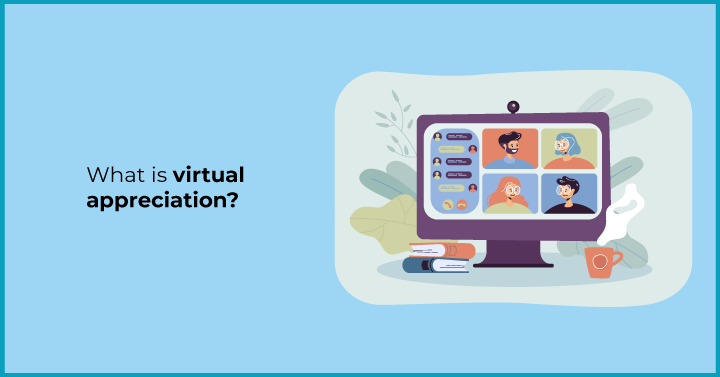Admit it; it feels great when your manager appreciates you for all the hard work and time you put in to achieve a target. The question is, how do managers appreciate a remote, distributed team? The answer is virtual recognition ideas.
Expressing appreciation for what employees achieve, has always been central to employee engagement. After all, you’re renting their time and skills to actualize your business goals. And when they succeed in meeting and exceeding your expectations, it's only fair that they get the credit for making it happen.
That being said, remote workers struggle to make their presence felt, and their contributions are known. If companies do not prioritize implementing a rewards and recognition system, then they wind up losing high performers. They will walk out the door, taking their skills with them.
I always make it a point to let the remote team I’m managing and working with know what they’re getting right. We often take breaks from work with team-building puzzles, or just a good old-fashioned group call. There, we go over the numbers and performance.
Seeing the difference these conversations make inspired me to dedicate a post to virtual recognition and employee appreciation, so here goes!
1. What is Virtual Appreciation?
Virtual appreciation refers to events and activities that a business conducts online to recognize the contributions made by its remote workforce. According to Gallup, a recognition-rich culture starts from the top. Employees look for meaningful recognition from the managers above them to who they directly report.
Interestingly, 85% of employees are satisfied with a simple thank you for their efforts. This simple act proves that expressing gratitude strengthens engagement and employee retention. Remote work opens you to a global talent market.
Your workforce composition can be diverse from both a cultural and contractual perspective. The one thing that brings people together is recognition for a job well done.
Virtual appreciation helps you build a rapport with such employees. Publicizing appreciation, in particular, includes everyone on the team. It lets them know what the criteria for recognition are and enables them to self-improve. Virtual appreciation prevents instances of managers giving employees preferential treatment or being biased in their assessment of an employee’s work.
It might be the case if some workers are passed up for promotions and others are promoted quietly. And also privately without the rest of the team knowing why.
2. Why does Employee Recognition Matter?
Employee recognition is a $46 billion dollar market. In addition, organizations that invest in employee recognition programs report 22% higher profit margins.
It's clear why.
Both formal and informal recognition tells employees that they are valuable. It encourages them to produce better work consistently. This, in turn, improves financial outcomes for the business. Performance-based employee recognition encourages staff to keep up with the good work.
It also acts as the catalyst for the others to follow suit and modify their approach or mindset to be next in line for consideration. Recognition conveys to the workforce that the management is taking notice of who all are competent. Employees who are putting in the efforts required versus those employees who just show up to work.
3. How do you Celebrate your Work Anniversary Virtually?
Rule Number One- maintain employee records indicating when they joined you, the department they belong to, and how long they’ve been working for your firm. You’ll never miss wishing someone who has a work anniversary coming up if you modify your settings for calendar reminders. Better yet, surprise them during a scheduled call by wishing them on it.
You can also prepare a small speech dedicated to thanking those who have remained with the organization the longest. And encourage them to say a few words before wrapping up the call!
4. Remote Employee Appreciation Day
Just because the workforce is remote is no excuse to go without celebrating it this year. Employee appreciation day usually falls in the first week of March, and this year in 2021, it's on March 5th. Employee appreciation day is an opportunity for you to try out a few virtual recognition ideas and reward your employees.
You can appreciate your virtual workers in a variety of creative ways! Remember to acknowledge efforts in writing to support what you say to your employees verbally. You can substantiate the recognition by specifying improvements, be it in attitude, presentation, skills sharing, acquisition, mastery, and utilization of skills.
5. How do you Celebrate Remote Employee Appreciation Day Virtually?
You can plan a remote employee appreciation day by collecting feedback from different departments for a list of achievements. Map them by employee profile and department. Mention in a group channel the virtual conference platform the time and date this meeting will take place. Schedule email invitations to ensure everyone attends.
You can determine and allocate the budget for a raise, promotion, and even gift boxing, complimentary vouchers, and time-offs in the next step. Such measures can be applied in line with the employee’s seniority, reliability, and association with the firm.
In the actual meet-up, start with the purpose of the call. And give virtual kudos to the team as a whole. Go through the names and rewards systematically and include a speaking time allowance to let everyone express how they feel. The questions to ask yourself as you plan virtual appreciation day are;
What does your company culture value the most? How to reward personal attributes? Where to set the bar for operational success and business performance?
Keeping these questions in mind makes it easier to pick out well-performing employees who embody and personify your company culture.
6. Virtual Employee Appreciation Day Events

The itinerary for virtual employee appreciation day events includes a speech commemorating the day. It could be announcing the activities you and your employees will be participating in, and closing with a moment. This goes to convey how important each and every individual is to the company. A few ideas include
6.1 Speakathon
Speakathons are a little unconventional but are nevertheless a great way to get your teams to open up. They are timed speaking events that discuss a selection of topics, ranging from a cause, trend or hobby that interests employees. Those who wish to participate can apply and prepare a presentation or speech. Such engagements can happen during a time that works for all in order for them to attend.
6.2 On-demand podcasts
If the idea of public speaking is too overwhelming for some of your virtual employees, then consider creating a webinar or podcast playlist. They can listen to on-demand in their leisure. Brownie points if the topic also doubles up as means to pick up new knowledge!
6.3 Pet Project
If any of your employees have pets, encourage a bring-your-pet-to-work day remotely where they can show their pet to coworkers! Caring for a pet is shown to lower stress, enforce routine and boost your mood.
6.4 Poster Designing
Conduct a poster designing contest using tools (anything from the rudimentary Paint program to Canva!). The most creative design can be used as a prize or award for future contests!
6.5 Virtual cookoff
Make brunch or other meal times interesting with a virtual cookoff. Either set a dish for the teams to try recreating and sampling, or have teams cook a specialty. They can share recipes and instructions and have someone else on the team try making it. Such contests help your team bond and appreciate a different culture or tradition!
7. The Best Practices for Virtual Employee Recognition
There are two types of motivation that push employees to do well and to maintain that status. These are:
1. Intrinsic
Intrinsic motivation refers to a virtual employee’s inner ambition. Factors that add to intrinsic motivation include one’s ability to put expertise to effective use. Hence, it is crucial that managers delegate or assign tasks, functions, activities, and projects to employees that offer them opportunities to learn and diversify their knowledge. At the very least, the work should harness their current skill set.
And
2. Extrinsic
Extrinsic motivation refers to the work environment and supports extended to the employees to enable them to grow. Rewards programs such as salary hikes, performance bonuses, job promotions, and professional development also fall under extrinsic motivators.
Extrinsic motivation gives career progression the visibility needed to fuel enthusiasm for the job. Put simply, when employees know how they can grow with the organization, they are more likely to give their best consistently.
The following virtual recognition practices can help you support and inspire your remote employees;
7.1 Define the Recognition Criteria
Structure the rewards and recognition framework in order to define the parameters for merit. It can be around the execution of work responsibilities:
- being proactive and showing initiative,
- problem-solving skills, and
- the effort and dedication to completing work within the constraints of deadlines and priorities.
7.2 Democratize the Process
Create a poll, questionnaire, or survey with questions pertaining to the rewards that your employees would appreciate and get the most out of. The feedback would help you tailor the rewards around what would make your employees happy to be recognized. It can be monetized (such as a pay hike or bonus), or incentivized (such as awards). You can also document a policy for complimentary time-offs and when they are applicable, such as birthdays, compensation for overtime, etc.
7.3 Equal Footing
All employees should be regarded impartially in work evaluation. This is where documenting the performance metrics comes in handy. The path to progress should be visible to employees by aligning growth opportunities to the relevance of their present roles.
And this has to be more deliberately performed in an office less culture due to geographic barriers.
7.4 Time-Bound Opportunities
It should be clear to virtual employees that rewards and recognition will not be a one-off event. And that there will be opportunities down the line that they will be considered for.
7.5 Verbalize Gratitude
Gratitude is free and can be expressed as and when appropriate. Be it in a group call, daily stand-up, weekly check-in, or one-on-ones, thanking an employee. Praising them for a job well-done boosts morale and validates their efforts.
The feeling of appreciation is what they’ll remember when they unplug from work.
7.6 Praise Publicly, Criticize Privately
A mistake some managers make is to only remember employees when they want someone to blame and hold accountable. Never put down team members in public and subject them to criticism with everyone listening. As important as constructive criticism is, it has to be contextual and in-private to give the employee the chance to rectify them. And when they get it right after a few tries, praise them to let them know they are on the right track.
7.7 Read the Social Cues
Observe how your virtual employees respond to recognition. Some prefer to be praised verbally while others prefer it in writing to avoid being put on the spot. You can take notes from social and visual cues to see which medium of communication individuals respond to. Accordingly, you can plan how to convey your admiration and appreciation for them.
7.8 Gamify Appreciation
Hold contests that test how team members work and think. Announce prizes for winners and runner-ups to make things interesting. It can be a custom trophy, certificate, gift or food coupons, or something personalized such as a laptop decal or coffee mug. It gives employees something to look forward to and engages them.
7.9 Social Recognition
A high-performing virtual employee can be recognized on social media networks such as a LinkedIn post. It raises their social profile and makes their contributions more prominent for the business community.
7.10 Buddy and Reverse Mentoring
Programs such as buddying up and reverse mentoring can not only bring down communication barriers but also create a facility for managers to help unhappy workers. In fact, growth engineering reported that having just one close connection in the workplace makes employees 50% happier. And happy employees are more productive, communicative, and engaged.
These practices build morale and give visibility into both the remote employer and employee expectations. In the next section, I’ll go into a few creative virtual recognition ideas to start you off on appreciating your remote staff!
8. Creative Employee Recognition Ideas
8.1 Celebrate birthdays and work anniversaries
Work anniversaries and birthdays are landmark days in an employee’s life and are cause for celebration. Simple mails that you can automate and send out and group chat announcements are measures that show you remember. You can even give virtual employees the option to take the day off or work shorter, flex hours.
8.2 Create a gratitude channel
Gratitude or kudos channel is a place that all members of departmental teams can be added onto. You can use a micro recognition system for messages to credit daily efforts and successes. For instance, a developer who resolved bugs on a code and got it up and running. He can be mentioned on the channel and thanked on a daily stand-up.
8.3 Host virtual parties
Who doesn’t love parties held in their honor? You can recreate the party atmosphere by having everyone dress up and have snacks. Gift allowances can be sent over before the date of the actual party. It's also great fun unwrapping things on camera and showing the other on-call what the gift item was.
8.4 Wall of Fame
A wall of fame can be on a whiteboard tool where the person’s name, picture, department, and reason for going up on the wall are listed. The tool administrator can moderate what goes into the wall and add employees of the month as and when appropriate.
8.5 Dedicate a website page on the team
You can give visibility to the team by including a brief write-up about them (with their consent) on the “team” page of your company website. Record a reel of your teams working together, giving individuals the option to voiceover their parts or be featured in a ‘why work for us?’’ segment.
Visitors to a website want to see faces and read about experiences, and such measures boost the credibility of your company. You can even attract prospective job applicants who are interested in being part of the team. As they want to know how the present work culture and team composition is before applying. Such teasers provide a glimpse of the company's values.
8.6 Conduct Virtual Contests
Virtual contests are fun for virtual teams to participate in while challenging them. For instance, you can do trivia hour with questions about your company. Whoever gets most or all answers right goes up on the wall of fame or the gratitude channel.
Other examples of virtual contests include puzzles with a time-limit, online board games, and sports such as mini Carrom or snooker. Such activities pump up employees and help them to come out of a productivity slump.
8.7 Merch Giveaways
This virtual recognition idea can get two birds with one stone. Announcing giveaways boost your company’s presence and prominence on social media while recognizing and appreciating employees. You can send gift mystery boxes or self-care packages to employees who in turn can share pictures. The unboxing videos can be a nice touch with their followers and friends. This directs more social media users to your business.
8.8 Social Media Shoutouts
You can write out a social media post chronicling the employee’s journey on either professional networks like LinkedIn or microblogs like Twitter. Social media shoutouts are a type of virtual kudos. Here everyone in your and your employees’ network sees the post and interacts with it.
These interactions are measurable through social analytics tools indicating the traction the post gets. The employee of honor can even share the update on their timeline and increase the number of impressions, or retweets.
8.9 Custom Vouchers and Gift Boxes
This virtual recognition idea depends on the team size and the budget you’re willing to set aside for gifting options. Be realistic about how much you’re willing to spend on wellness packages or vouchers.
You can take personal preferences into account and put together an assortment of things that employees will like and use. If gift boxes are impractical against the workforce strength. Instead, you can email vouchers to e-commerce stores that the employees frequently buy from.
8.10 Meal Coupons to Select Restaurants
Meal coupons with discount codes are one of the best recognition ideas invented. After all, we all need to eat! And if they are valid for a certain number of orders or months, virtual employees can apply them.
More so, it can be used on more than one busy workday. They can look up restaurants near them that deliver, helping them save both time and money.
8.11 Invite Employee Feedback
Be intentional about giving and getting feedback. Inviting feedback from employees lets you know how they react and respond to your style of leading and managing. It is a learning opportunity for managers to understand how to manage remote teams better.
If an employee’s productivity is fluctuating and tanking, managers can get to the root cause. They must work with the employee to overcome what they’re struggling with. Then, it also gives employees the chance to know what they are getting right and the course-correction measures. They will need these to take in order to improve and maintain consistency in performance.
8.12 Complimentary offs
Virtual employees who have worked overtime hours on billable projects can cash in complimentary offs for those weeknights and weekends. They can avail it subject to approval from the manager or team lead they report to. Setting their status online to DND means they don’t need to take work calls or answer emails on a complimentary day off.
8.13 Paid Overtime
If complimentary days off are not practical for your business model, here are some alternatives. For example, you can consider paying employees overtime after assessing the effort hours, utilization reports, and time spent on projects, tasks, and functions.
8.14 Referral Bonuses
Referral bonuses refer to the encashment a current employee receives for referring someone in their network to vacancies you’re trying to fill in. If the person the employee refers is right for the job and is offered it, you can thank the employee by crediting the bonus with their salary.
Plus a special mention in a group or private chats. This is entirely optional but worth considering. If you want to reduce the lead time to hire and then onboard new employees by involving more of your current employees.
8.15 Use Caricaturists and Artists
Collect photos of your team and employ a caricaturist or artist to sketch them. The employees can have something to remember and keep as a memento! Some companies even commission oil or watercolor paintings of their leadership team. It's a form of respect and a way of recognizing their contribution in the field.
8.16 Nominate a Co-worker
Virtual employees can be surveyed digitally where they can name a coworker that they think deserves recognition. It involves and includes virtual employees in the structuring of a rewards and recognition program.
Consequently, they can even vote on the name of the program, such as the Best of the Beasts. (while this is just off the top of my head, and a play on the Best of the Best!). Such measures encourage teamwork and prevent colleagues from taking each other for granted.
8.17 Celebrity Live Feeds
Does your team have a favorite sport, star, author, or actor? You can arrange to reach out to the team managing the celebrity for a live stream. This virtual recognition idea is a bit unconventional and potentially expensive. But they do give the employees something to look forward to, especially if you manage to keep it under wraps till it's confirmed!
8.18 Company Merchandise
Commission t-shirts, mugs or stationery personalized with the company logo and employee name or number. It's also a form of advertising for your business when employees use or wear the merch and prompt conversations about it.
8.19 Online Photobooth
Get your virtual team together for a group meet and surprise them with a candid photo booth session! Use an app and play around with filters to make it more fun. You can snap several such shots and create a timelapse of the photos that developed best. Upload these onto a watercooler hangout for employees to look at!
8.20 Form a Music Band or Dance Studio
Your remote workforce are rockstars, and what screams that better than allowing them to form a band? Employees can
- Show off their talent at the arts,
- Host karaoke nights and
- A host of other post-work hours fun activities amongst themselves!
It not only recognizes who your employees are outside of work but lets them be more comfortable working with each other, building a rapport.
9. How do you show Appreciation Virtually?
Everyone likes their work and efforts to be recognized. And it is expected of employers that they appreciate the employees working for them. Not all virtual recognition ideas are costly.
The best way for managers and businesses to show appreciation virtually is to recognize and reward with uniformity. Decide on the what, when, and how of virtual recognition ideas and weave them into your remote work culture toolkit.
The virtual recognition ideas listed here will help you get started and enable you to strengthen work relationships. Which ones did you like best, and are willing to try?
 Interested in Virtual Team Building Events?
Interested in Virtual Team Building Events?




























